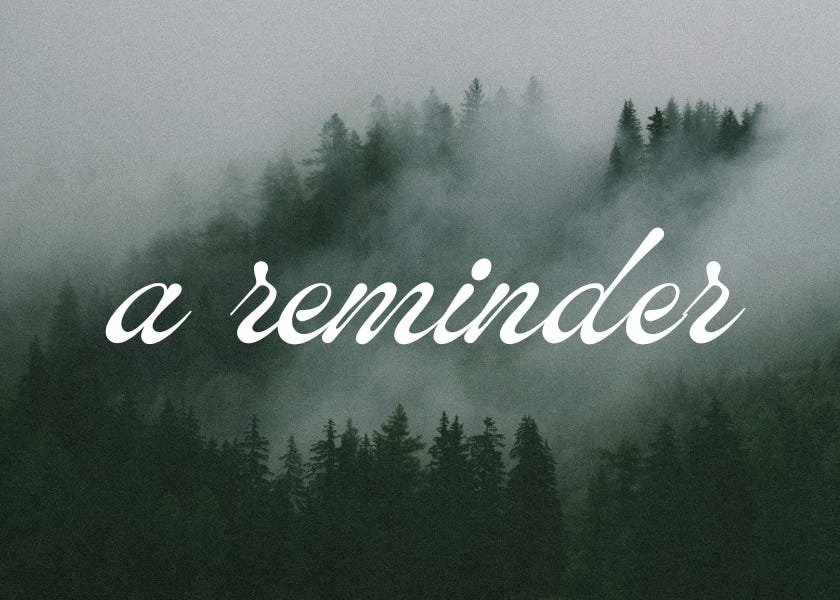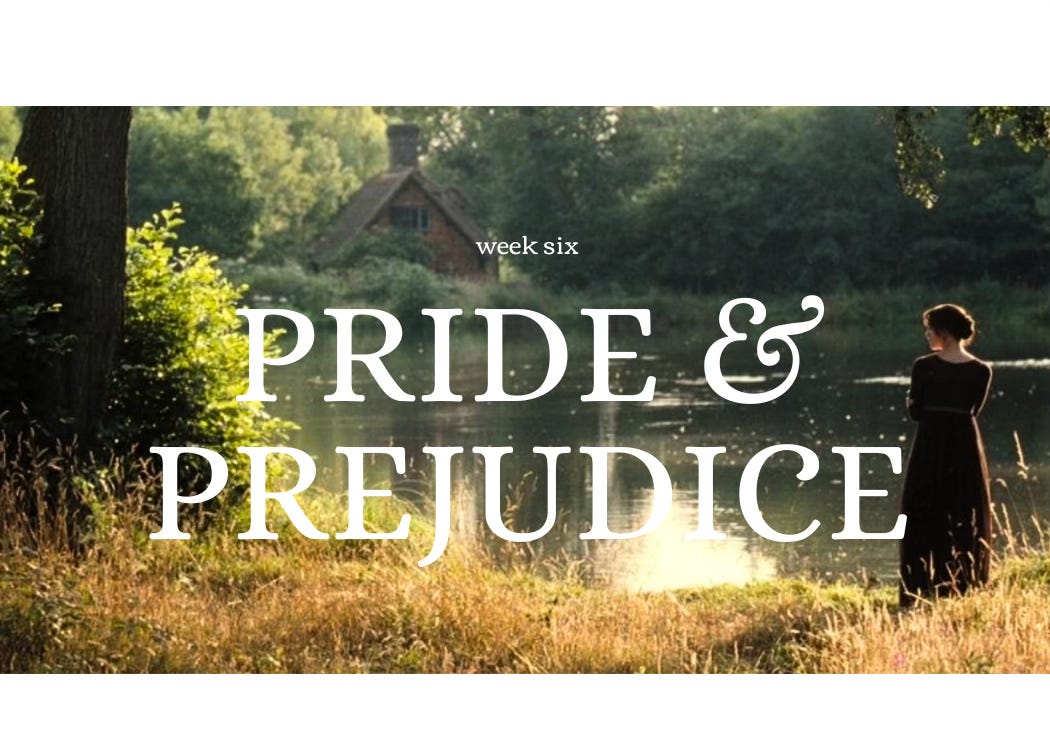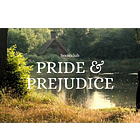"my feelings will not be repressed"
Pride & Prejudice | Week 6: Vol. 2 chapters 7-14 | on performing for strangers, ardent feelings, and unexpected visits
Welcome to the Closely Reading book club: a space where we closely read classic literature together and discuss assigned chapters each week.
Today, allow me to share with you a small, gentle reminder as we move through the middle parts of the novel that it’s normal to fall behind, want to rush to the end, or start to doubt if you’re wanting to finish this whole experience at all.
Closely reading can be so pleasurable, yes, but it is also deeply taxing. This is, I think, a feature and not a bug. By closely reading, you ask your brain to do the opposite of what it is rewarded for all day long. (At my job, being able to multitask and complete things in less than an hour is something I’m constantly praised for; that model does not serve me when it comes to literature!)
If you’re falling behind, please know there are no judgements here. Reading “old books” is hard for our brains; reading them slowly is even harder. Banish the shame! Remind yourself that these posts are up for you whenever you’re ready for them. Take a break. Take a breather. We’ll love to have you back again when you’re ready!
This week, we’re discussing Pride & Prejudice volume 2, chapters 7-14 (or continuous chapters: 30-37).
We got a rather infamous proposal scene this week…! As well as a rather infamous rejection of said proposal. I can’t wait to dive into the reading with you all!
Welcome to week 6 of our Pride & Prejudice read-a-long
If you have not completed our chapters for this week yet, I encourage you to do so before reading today’s guide. (Especially chapter 11. SQUEAL.)
Please remember to avoid spoilers in the comments.
Now let’s get to it!
Were you squealing during the proposal? I couldn’t put my book down! The pacing of the setup to get to the proposal scene is so devastatingly good.
In chronological order, here are some highlights from this week’s reading (with new characters in bold):
Mr. Darcy visits the Collins’ household while Elizabeth is still visiting, and he brings along one of his best friends, Colonel Fitzwilliam (not handsome, 30)
Lady Catherine hosts Easter dinner; Darcy, Elizabeth, the Collinses, Colonel Fitzwilliam, and the de Bourgh household are in attendance
Elizabeth plays the piano and tells Colonel F. about Darcy’s prejudiced behavior at the balls in Netherfield and Longbourn; Lady Catherine keeps butting in (I am in love with her obvious need to be in every conversation—she’s the worst)
Darcy visits Elizabeth at the Collins’ home alone ! Charlotte assumes he must be in love with Elizabeth; Elizabeth spends like two whole pages coming up with other things it must be because it cannot be love
Elizabeth finds out that Darcy was the one who separated Bingley from Jane, per an anonymized story from Colonel Fitzwilliam; she is furious
Darcy proposes to Elizabeth; she is stunned
Elizabeth rejects her second proposal of the novel; she is pissed
Darcy gives Elizabeth a letter; she is caught off guard
Elizabeth reads and rereads the letter, feeling “perturbed” by the sheer amount of new and exciting information in its pages; she is confused
Elizabeth rejects another offer, from Lady Catherine, to extend her stay; she continues to “study” Darcy’s letter as she plans to return home; she is obsessed
There is so much to potentially analyze from this week’s chapters. Among them:
The language of economy: There is Mr. Bingley, who Colonel Fitz feels is “indebted” to Darcy; there is the concept of who can “afford” to marry for love. Again, we see echoes of the first sentence that wed money to love in intricate, life-defining ways.
The language of “pride” and “prejudice”: This week, Elizabeth and Darcy both dance between the titular tension. Lizzy feels her pride wounded by Darcy’s prejudice against her “inferior rank,” and Darcy’s own pride is walloped by the mule-kick force of Lizzy’s fiery rejection.
The language of feelings: As Lizzy toils over Darcy’s proposal, the contents of his many visits and letter, she is forced to re-examine her own role in the tension between them — and how her own pride and her own prejudice have kept her from a full understanding of events, emotions, and connections between people she thought she knew so well.
The power of close reading: One of our readers asked about how Austen is instructing us to become better readers in the way she writes the novel. I thought about that so much while I was reading this week, especially when I encountered Darcy’s letter.1 Elizabeth finds herself profoundly changed by his letter; he is a different man to her now. His letter suggests to me the power of words to change someone’s mind, and the force of authenticity he brings to Lizzy’s life (“we neither of us perform for strangers,” he says at his first visit to Lizzy at the Collins’ home). His defenses are down; what will Elizabeth do now?
This is a rich section of the book, filled to the brim with fulfillments (places where previous storylines gain answers, like the mystery around Wickham’s hate for Darcy) and with new provocations (places where new storylines start to emerge, like the deeper question of Darcy’s personality and apparent pride). All of these new tangled lines of story leave us—along with Lizzy—baffled and surprised and confused.
I found myself laughing (once again!) at how brilliant Austen leverages the art of free indirect discourse to keep us at enough distance to see Lizzy’s faults and misguided judgments while managing to keep us close enough to her mind so that we understand her indignation and shock at being proposed to by the man she has felt most judged and wounded by in the story thus far.
I was also struck by how far away I feel from Darcy; and how much his letter—in his own flowing, beautiful prose—made me feel closer to him. Like Elizabeth, I was completely taken in by his letter and found myself loving him. I was intrigued and confused and charmed by him in the most unexpected ways.
Austen would’ve been a powerfully dangerous catfisher.
This week, I also found myself thinking about the profound differences between the two proposal adaptations from the BBC 1995 miniseries and from Joe Wright’s 2005 film. I’m leaving clips to each proposal scene below, so you can see how differently each adaptation wields its subject material to very different effect.
Here is the 1995 version, starring Jennifer Ehle and Colin Firth. Notice the adherence to the text: Elizabeth is sorting through Jane’s letters; Darcy hopes she’s feeling better; they’re in Charlotte’s sitting room; the awkward pauses and lines of dialogue are taken straight from the novel’s pages.
And here’s the same scene, rendered by Joe Wright, with a profound artistic decision to move the proposal outside in the rain. (It works for me!!!!) Notice the changes: We’re far from Charlotte’s sitting room; Lizzy has just run from the church where she talked to Colonel Fitzwilliam and found out about Darcy taking Bingley from Jane. Tensions are high; the dialogue is modernized while still keeping with some of Austen’s best zingers.
One of my favorite parts of this re-interpretation are the ways they interrupt each other. Far from the polite, if stunned, pauses and awkward silences in the novel and 1995 versions, this 2005 version gives Darcy and Lizzy a chance to banter more energetically—with the fullness of their anger, frustration, and misgivings about each other.
When Lizzy shouts through his statements, “how sir?!” and “my pride?!” my eyes bug out of my head every time.
I think Knightley captures Lizzy’s fiery energy in a very different way than Ehle does. Both actresses are highly effective and believable as Lizzy. But I have to say: Knightley’s jaw acting here is phenomenal and I love the way she uses her teeth as a quite effective sparring tool to visually display her anger and defensiveness. Forced to choose a Lizzy, Knightley is totally it for me.
Okay: let’s shake things up. I’ve been trying to get myself out of my comfort zone of pen, paper, and ideas. The doldrums of February have me feeling stagnant. So I’ve been playing with creativity in new ways. Maybe you’ll like to try these:
Play casting director. Who would you cast in a new miniseries adaptation of the novel? Would you put it on HBO? AppleTV? Netflix? (Each distributor has such different treatments for story…)
Create a collage out of magazine cut-outs that capture your “feelings” or your experience of reading the novel so far. Do you find yourself emphasizing gauzy images of the English country? Fine castles and ballrooms? Worn pages and leather-bound books?
If you have an artistic medium you favor—like painting, ceramics, or charcoals—try channeling your latest reading experience of the novel into your favorite forms.
Every week, I share my favorite sentence. And I invite you to do the same in the comments.
“She studied every sentence: and her feelings toward is writer were at times widely different.”
Just one question this week—and it’s a great one.
Question:
I noticed in this week’s section that Charlotte calls Elizabeth “Eliza,” when we see most other characters use the nickname “Lizzy.” I’m curious what you know about the use of nicknames at the time. This also got me wondering about the different names the narrator uses for characters and whether that might be a tool of free indirect narration. The characters seem to be following social norms of what names to use when, but the narrator’s usage seems to vary (Elizabeth/Lizzy/Eliza or Charlotte/Mrs. Collins, etc).
Answer:
I love this question! You’ll be pleased to know that scholars have wondered about it, as well. (Exhibit A: A sociolinguistic study on nicknames in Austen. It’s behind a paywall, which I don’t recommend paying around—this is just an example. And here’s Exhibit B: Hierarchies of Choice: The Social Construction of Rank in Jane Austen. If you’ve a university library account, please do let us know how these are!)
I can certainly do more reading on the background here as I continue to collect resources, but maybe you’re interested in my own close readings of this theme in the novel? I see nicknames as a signifier of intimacy in the novel: Lizzy is a family nickname; Eliza is her beloved’s friend’s nickname for her. She is “Miss Bennet” to Mr. Collins and to Mr. Darcy. And I believe she is “Miss Elizabeth” to Caroline Bingley.
Based on the varying levels of intimacy and familiarity that an individual has with Elizabeth, we seem to get a different name that signifies the depth and love in their relationship.
I love that you’re noticing that the narrator seems to use different naming conventions—and I think it’s partly that level of intimacy with the characters (our free indirect narrator gets to be very close to some characters, while maintaining somewhat awkward distance from others). Your question has be thinking, though, about how the names are also used in scenes to help us understand the “social role” an individual is occupying in specific moments or interactions. I’m thinking, specifically, of how Charlotte is transformed into Mrs. Collins when they are at Rosings.
I also find it curious that we don’t know the first names of Mr. or Mrs. Bennet — they are always known by their parental and community signifiers. (At this time, historically, I believe that it was rare for general acquaintances to use first names; people were known by their family names—and as intimacy increased, their first names and then their nicknames.)
For what it’s worth: the 2005 film adaptation has a staggeringly beautiful build on this idea of nicknames and intimacy (and is likely what has informed my own reading).
More to come, should I come across naming conventions in my wider research!
Want to submit a question for next time? Here’s the form.
WEEK 7 | Monday, March 3
Read volume 2, chapters 15-19, the end of Volume 2
Continuous chapters: 38-42
We’re wrapping volume 2 next week — can you believe it?!
The full schedule is available here:
Thank you for being here
If you’d like to explore your options to becoming a paid subscriber, there are monthly and annual options available.
If you’re a student (or grad student) with a tight budget,
please reach out to me for a special offer.
Meet me in the comments
Here are a few questions to help you get started.
What was your favorite part?
What did you think of that proposal scene?!
What was your favorite quote?
Any great casting ideas for your own interpretation of the novel?
‘Til next time…happy reading!
People love Darcy’s letter so much you can get it printed on a scarf or to hang on your wall.














After the unexpected proposal and wrestling with Darcy's letter, Elizabeth concludes that she has been "blind, partial, prejudiced, absurd". She is utterly humiliated: "But vanity, not love, has been my folly." Maybe that first meeting where Darcy refused to dance with her, commenting that she "is tolerable...but not enough to tempt me", stung more than she admitted to herself and prejudiced all her future dealings with him. Darcy's social awkwardness and real or perceived arrogance confirmed her indifference to what he thought of her. She certainly now sees how her prejudice based on appearances led to her being taken in by Wickham. She is also coming around to considering that "Jane's disappointment had in fact been the work of her nearest relations". So pride, especially a vain sort of pride, and prejudice are all over these chapters and causing havoc in the emotional and the actual lives of the characters.
This is one of my all time favourite parts of the book. Both are just so on point in their dialogue. Watching the contrasting movie scenes was interesting. The classicist in me prefers 1995, however, the passion of 2005 is not to be denied.
What I absolutely am here for is the interchangeability of the words 'pride' and 'prejudice' pertaining to both Lizzy and Darcy. At various times throughout the tale both are guilty of demonstrating both their pride and prejudice. Got to love how Austen weaves this tale.